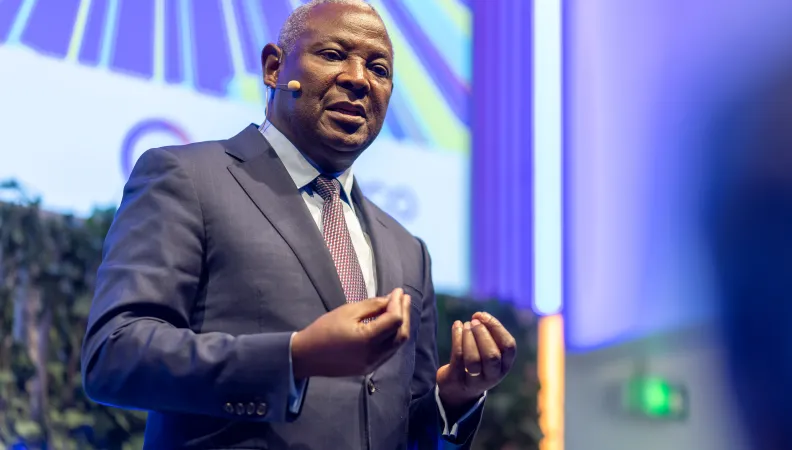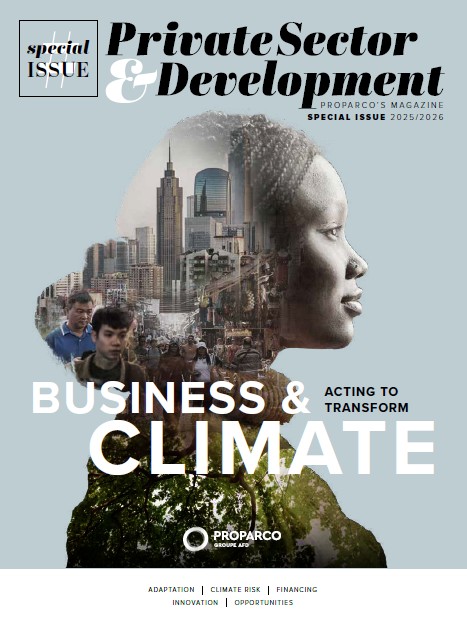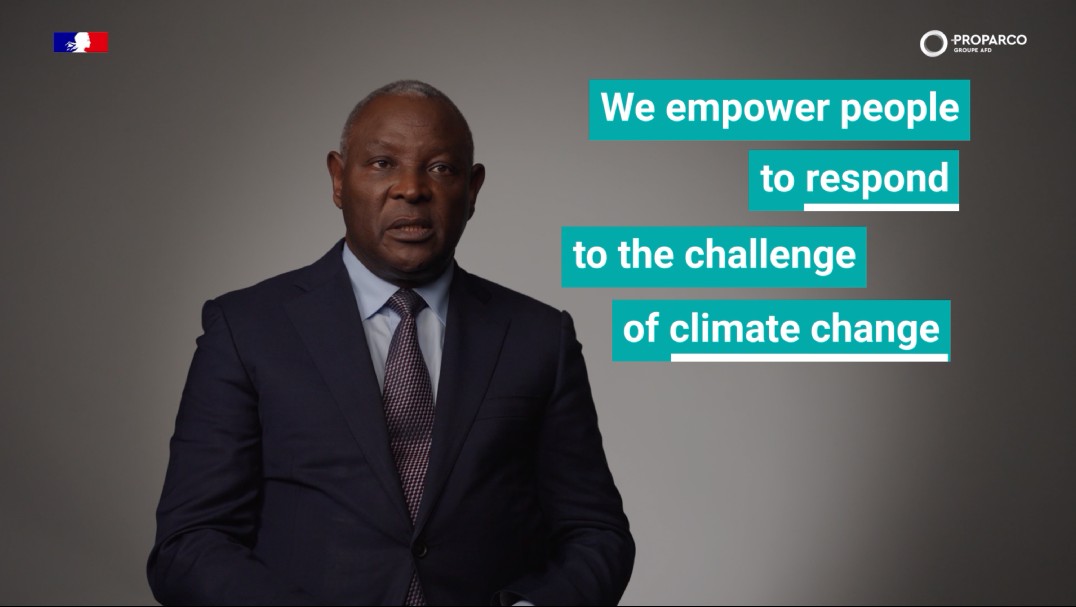Share the page
Climate finance in Africa: profitable and deeply transformational
Published on
Dr. James Mwangi CEO of Equity Group Holdings Plc Equity Group Holdings


Private Sector & Development - Business & Climate: Acting to transform
Proparco has published a new edition of its Private Sector & Development magazine, focusing on the strategic role of the private sector and financial institutions in tackling the climate emergency.
Equity Group is addressing the climate challenge in Africa by combining green loans, capacity building, and targeted partnerships. The Group is dedicating an increasing share of its portfolio to financing sustainable projects, and its climate strategy is now deeply embedded across all its activities. Partnerships established with development finance institutions enable it to offer de-risked financing and to train its teams and clients in assessing climate-related risks and opportunities.
What are the main challenges in financing climate projects in Africa?
The biggest challenge remains access to affordable, long-term capital at scale. Africa contributes less than 4% of global emissions but bears the highest cost of climate change. Yet climate finance flows to the continent remain below 5% of global volumes. Risk perception is another barrier – African projects are often deemed too small, risky, or fragmented for global investors. Finally, the lack of harmonized data, project pipelines, and blended finance structures makes it difficult to mobilize private capital. The solution lies in creating de-risked investment vehicles that align public, private, and philanthropic capital, while building strong local financial institutions capable of structuring and deploying funds at scale. At Equity Group, we are working to close this gap by combining green lending, capacity building, and partnerships that crowd in concessional capital to unlock Africa’s transition and resilience potential.
How does Equity Bank integrate climate finance into its strategy?
Climate finance is now at the heart of Equity Group’s Africa Recovery and Resilience Plan, which aims to finance Africa’s green industrialization and inclusive growth. We view sustainability not as an add-on, but as a strategic imperative integrated into every aspect of our business. Our climate strategy focuses on three areas: greening our internal operations, greening our loan book, and enabling clients to transition to sustainable practices. Through our subsidiary, Equity Group Foundation, we complement this by empowering communities through climate-smart agriculture, renewable energy access, and ecosystem restoration. Our goal is to allocate over 30% of our lending portfolio to climate-aligned sectors by 2030, supporting smallholders, MSMEs, and industries in adopting cleaner technologies and practices. This holistic approach links economic growth to environmental stewardship and social inclusion.
What concrete methods does Equity Bank deploy to identify, assess, and mitigate climate risks in its portfolio and operations?
Equity Bank integrates environmental and social risk management (ESRM) into its credit processes, guided by international standards such as the IFC Performance Standards and the Equator Principles. Every loan is screened for potential environmental and climate risks, categorized by exposure level, and mitigated through tailored covenants and client support. We are also developing a Climate Risk Framework 1 See: https://equator-principles.com/ aligned with the Task Force on Climate-related Financial Disclosures (TCFD) to assess physical and transition risks. Our internal sustainability team works with business units to ensure resilience across sectors – particularly agriculture, energy, and infrastructure. In parallel, we have launched capacity-building programs to train staff and clients on climate risk and opportunity management. By embedding these mechanisms into our governance, we are building a resilient balance sheet capable of withstanding climate shocks, while identifying green growth opportunities.
How does Equity Bank integrate climate risk assessment and management into its credit processes?
Climate risk management is embedded at every stage of our credit process – from due diligence to monitoring. Each project is screened for physical and transition risks using an Environmental and Social Risk Assessment (ESRA) tool. High-risk sectors undergo deeper technical evaluation, and mitigation measures are built into loan covenants. We are also piloting climate stress testing for our portfolio to identify the sectors most vulnerable to droughts, floods, and policy shifts. These insights inform our credit policies and product design, ensuring long-term portfolio resilience. Moreover, we provide clients with advisory support to strengthen their own climate risk management. This integrated approach ensures that sustainability is not just a compliance issue, but a competitive advantage and a key driver of financial stability.
How do you assist SMEs in their transition to sustainability?
SMEs are the backbone of Africa’s economy and the key to a just transition. Equity Bank supports them through an integrated ecosystem approach – combining finance, capacity building, and market access. We offer tailored green credit lines for renewable energy, water management, and sustainable agriculture, alongside technical assistance to help SMEs meet environmental standards and access new markets. Through the Equity Group Foundation, we train entrepreneurs on climate-smart business models and resource efficiency. Our partnerships with institutions such as Proparco and the African Guarantee Fund also help de-risk SME lending. We are now developing digital tools and climate scorecards to help SMEs benchmark and improve their sustainability performance. This combination of finance and knowledge ensures that Africa’s millions of small businesses are not left behind but are empowered to lead the green transition.
What role does partnerships with development finance institutions (DFIs), like Proparco, play in your approach?
Partnerships with DFIs are catalytic in bridging Africa’s climate finance gap. Institutions like Proparco bring not only capital but also credibility, expertise, and risk-sharing instruments that enable us to scale our impact.
Our partnership with Proparco, through lines of credit and technical cooperation, has strengthened our ability to finance green and inclusive sectors – from renewable energy to women-led enterprises. DFIs play a critical role in de-risking early investments, crowding in private capital, and aligning financial flows with the Sustainable Development Goals.
By combining DFI support with our local reach – over 18 million customers across East and Central Africa – we are creating a powerful multiplier effect. Together, we are proving that climate finance in Africa can be both bankable and transformational.
What major progress have you seen from your climate initiatives?
Our progress is visible in both numbers and impact. Over the past three years, we have financed more than USD 500 million in renewable energy, climate-smart agriculture, and green MSME projects.
We have supported over 1.4 million farmers in adopting regenerative agricultural practices and have expanded clean energy access through solar and biogas solutions. Our branches now operate largely on renewable power, and we are on track to achieve carbon neutrality in our operations by 2030. At the community level, the Equity Group Foundation’s tree-planting program, has already planted over 26 million trees across Kenya, the DRC, and Rwanda. These efforts are translating climate ambition into tangible results that build both ecological resilience and shared prosperity.
How do you measure the social and environmental impact of your work?
We apply a triple-bottom-line approach – People, Planet, and Prosperity – to measure our impact. Our internal Environmental and Social Risk Management system tracks portfolio-level sustainability performance, while independent evaluations assess our community programs under the Equity Group Foundation. Metrics include greenhouse gas reductions, number of green jobs created, renewable energy capacity supported, and lives improved through clean water, education, and health access. We also align our reporting with global frameworks such as the SDGs, GRI, and TCFD. Beyond metrics, we believe impact must be lived – seen in stronger livelihoods, restored ecosystems, and thriving local enterprises. Our vision is to ensure that every dollar invested creates shared value for both people and the planet.
To go further
Voices for Change - Dr. James Mwangi, Equity Group
In this Voices for Change episode, Dr. James Mwangi, CEO of Equity Bank, shares how finance can become a force for climate resilience and inclusive prosperity across Africa.
Published on November 4, 2025
Further reading
Where climate risk meets opportunity: how Ecobank is financing Africa’s future
Published on November 6, 2025





